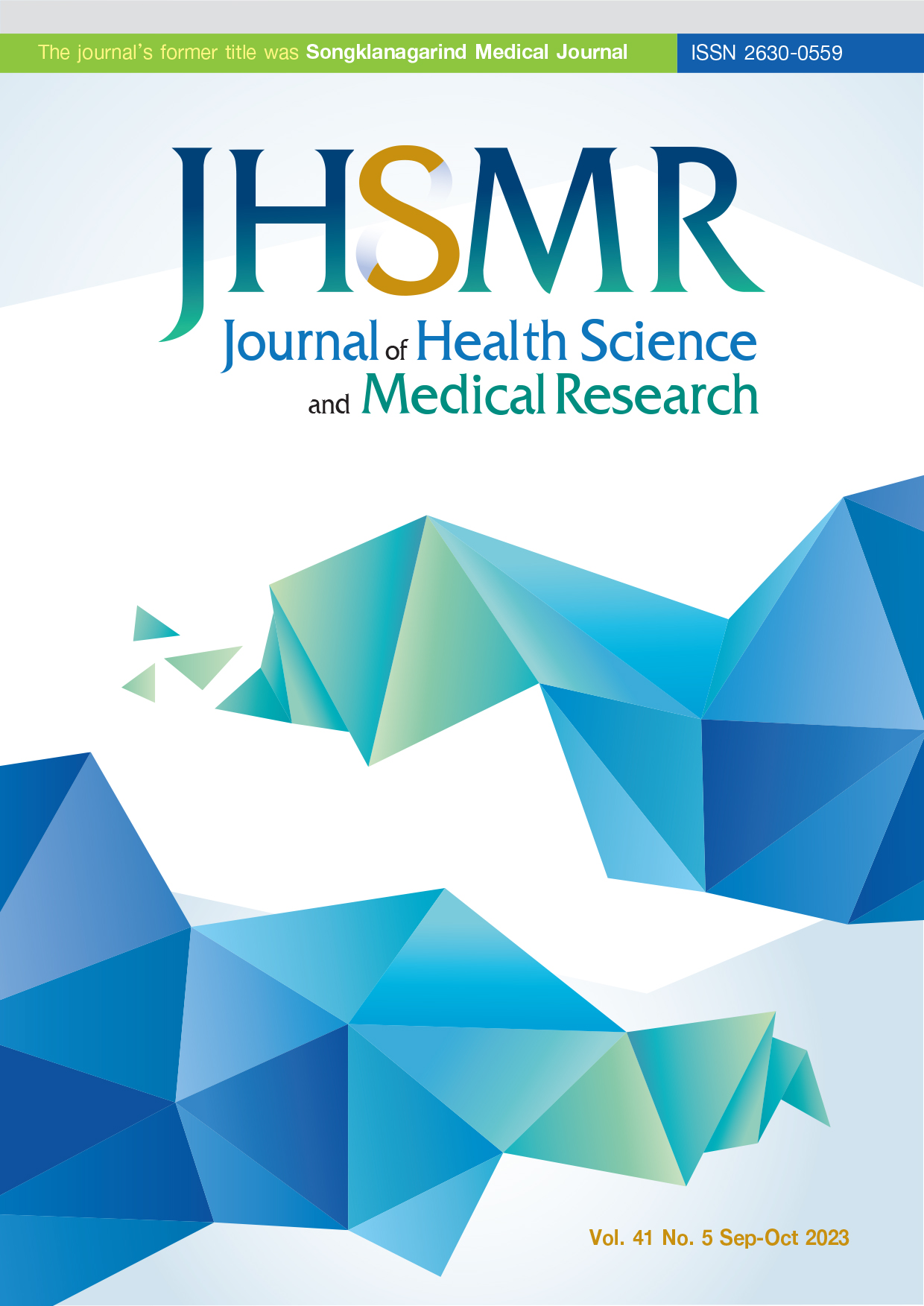Correlation between Initial International Prostate Symptom Score (IPSS) and Complications of Benign Prostatic Hyperplasia
DOI:
https://doi.org/10.31584/jhsmr.2023948Keywords:
benign prostatic hyperplasia, International Prostate Symptom Score, complication, lower urinary tract symptomAbstract
Objective: Benign prostatic hyperplasia (BPH) is a common disease in elderly men, and some of them are suffering from its complications. Early detection and management of complications of BPH will lead to optimal results of treatment. The International Prostate Symptom Score (IPSS) is a disease and symptom-specific scoring system used for initial evaluations of BPH patients. This study aims to determine the correlation between initial IPSS and complications resulting from BPH.
Material and Methods: This hospital-based cross-sectional study enrolled all male patients, aged 60 years and above having complained of lower urinary tract symptoms (LUTS), at the outpatient clinic. Patients’ demographic data (age), IPSS, and history of complications from BPH; including urinary tract infection (UTI), hematuria, urinary retention and prostate related surgery were collected.
Results: In total, 301 patients were recruited in this study, with a mean age of 70.1 years old. There was significant correlation between age and IPSS (p-value 0.034), by using correlation coefficients. Sub-group analysis demonstrates a significant correlation of IPSS (both mean and severity group classifications) and complications from BPH (UTI, hematuria, urinary retention, and prostate surgery due to BPH) (p-value<0.001).
Conclusion: The rate of complications, due to BPH including UTI, hematuria, urinary retention, and BPH-related surgery, correlate with higher initial IPSS.
References
Speakman MJ, Cheng X. Management of the complications of BPH/BOO. Indian J Urol 2014;30:208-13.
Barry MJ, Fowler FJ Jr, O’Leary MP, Bruskewitz RC, Holtgrewe HL, Cockett AT, et al. The American Urological Association symptom index for benign prostatic hyperplasia. The Measurement Committee of the American Urological Association. J Urol 1992;148:1549-64.
Lerner LB, McVary KT, Barry MJ, Bixler BR, Dahm P, Wilt TJ, et al. Management of lower urinary tract symptoms attributed to benign prostatic hyperplasia: AUA GUIDELINE PART I-Initial Work-up and Medical Management. J Urol 2021;206:806-17.
Gravas S, Cornu JN, Gacci M, Gratzke C, Herrmann TRW, Tikkinen KAO, et al. Management of Non-Neurogenic Male Lower Urinary Tract Symptoms (LUTS), incl. Benign Prostatic Obstruction (BPO). Arnhem: European Association of Urology; 2022.
Nontakaew K, Kochakarn W, Kijvika K, Viseshsindh W, Silpakit C. Reliability of a Thai version of the International Prostate Symptom Score (IPSS) for the Thai population. J Med Assoc Thai 2014;97:615-20.
Hopland-Nechita FV, Andersen JR, Beisland C. IPSS “bother question” score predicts health-related quality of life better than total IPSS score. World J Urol 2022;40:765-72.
Bosch JL, Hop WC, Kirkels WJ, Schröder FH. The International Prostate Symptom Score in a community-based sample of men between 55 and 74 years of age: prevalence and correlation of symptoms with age, prostate volume, flow rate and residual urine volume. Br J Urol 1995;75:622-30.
Gyasi-Sarpong CK, Acheampong E, Yeboah FA, Aboah K, Laing EF, Amoah G. Predictors of the international prostate symptoms scores for patients with lower urinary tract symptoms: A descriptive cross-sectional study. Urol Ann 2018;10:317-23.
Wadie BS, Badawi AM, Ghoneim MA. The relationship of the International Prostate Symptom Score and objective parameters for diagnosing bladder outlet obstruction. Part II: the potential usefulness of artificial neural networks. J Urol 2001;165:35-7.
Tantiwong A, Nuanyong C, Vanprapar N, Swasdipala P, Chittapraphai S. Benign prostatic hyperplasia in elderly Thai men in an urban community: the prevalence, natural history and health related behavior. J Med Assoc Thai 2002;85:356-60.
Eze BU, Ani CO, Mbaeri TU. Is intravesical prostatic protrusion associated with more complications in benign prostatic hyper-plasia patients? Low Urin Tract Symptoms 2021;13:468-74.
Lieber MM, Jacobsen SJ, Roberts RO, Rhodes T, Girman CJ. Prostate volume and prostate-specific antigen in the absence of prostate cancer: a review of the relationship and prediction of long-term outcomes. Prostate 2001;49:208-12.
Holtgrewe HL, Mebust WK, Dowd JB, Cockett AT, Peters PC, Proctor C. Transurethral prostatectomy: practice aspects of the dominant operation in American urology. J Urol 1989;141:248- 53.
McConnell JD, Bruskewitz R, Walsh P, Andriole G, Lieber M, Waldstreicher J, et al. The effect of finasteride on the risk of acute urinary retention and the need for surgical treatment among men with benign prostatic hyperplasia. Finasteride long-term efficacy and safety study group. N Engl J Med 1998; 338:557-63.
McConnell JD, Barry MJ, Bruskewitz RC. Benign prostatic hyperplasia: diagnosis and treatment. Agency for Health Care Policy and Research. Clin Pract Guidel Quick Ref Guide Clin 1994;8:1-17.
Downloads
Published
How to Cite
Issue
Section
License

This work is licensed under a Creative Commons Attribution-NonCommercial-NoDerivatives 4.0 International License.
























